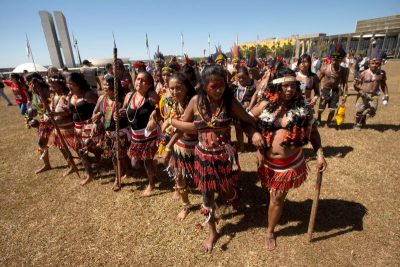Brazilian Government Wants to Destroy the Culture of Native Peoples

Recently, Brazilian government appointed Ricardo Lopes Dias to the position of coordinator of isolated peoples at the National Indian Foundation (Fundação Nacional do Índio – FUNAI). The act was made possible by a small but substantial change in the Foundation’s bylaws, which created the possibility for people who are not career servants to assume commissioned positions of command. The change came shortly before the appointment, indicating that Ricardo Dias’ specific appointment was the reason for the reform.
The biggest problem involving Ricardo Dias, however, is another: the new coordinator is a former evangelical missionary, having already worked for more than a decade in the evangelization of indigenous peoples, when he was then a member of the New Tribes of Brazil Mission, an organization born in the USA whose objective is to spread Protestantism among Brazilian indigenous peoples.
Ricardo Dias is an PhD anthropologist and Protestant theologian. The controversies surrounding his appointment – in addition to the administrative issue – revolve around a central point: the possibility, ignited by his past, of the coordinator to use his position to promote the forced “evangelization” of isolated peoples, reviving a policy towards the indigenous peoples that Brazil has sought to abandon for decades.
Hundreds of women from several indigenous tribes march during their second day of protests, in Brasilia, Brazil, 13 August 2019, to demand Jair Bolosnaro’s far-right Government to set further health care providers at their territories, which they consider ‘threatened’ under his policies. The women, who have arrived from several territories of the country, will join the traditional farmers march tomorrow. EPA/JOEDSON ALVES
Since the end of the military dictatorship, Brazil has tried to overcome the notion of “social integration” of isolated peoples, aiming to protect them in their traditional customs and respecting their space in the national territory. Brazil is one of the few countries in the world where it is still possible to find entire villages that have never had any contact with modern civilization, or have had it on a small scale. During the military regime, state policies aimed at these peoples sought precisely to integrate them into modernity and the consumer society. This is a concept that, after 30 years of democracy, is returning and gaining strength with the new neoliberal wave that marks the Bolsonaro’s government.
The organization of which Dias was a member is also the target of the most diverse controversies involving its activities in isolated regions of Brazil. The most controversial case involving the group concerns an epidemic that hit an isolated people in the Amazon Rainforest due to local contact with evangelical missionaries, killing several people. Although Dias currently denies involvement with the organization, the group congratulated his nomination and celebrated it with enthusiasm.
In fact, there is no problem with the evangelization of the native peoples itself. However, contact between missionary groups and indigenous ethnicities in the Amazon region has occurred throughout Brazilian history, often in a violent and proselytized way, generating the imposition of one culture on another, instead of the voluntary conversion of a people to a new faith. These isolated peoples, totaling 107 ethnic groups, voluntarily chose their situation of isolation, indicating a desire to preserve their traditions by the absence of contact with the world outside the Amazonic forest. The Brazilian Constitution safeguards this right, which has been precariously preserved over the past three decades. However, the advancement of neoliberalism and the power struggle by the evangelicals, the military and the rural entrepreneurs has rekindled the persecution and exclusion of indigenous people, increasing the number of assassinations and modernizing attacks against these peoples.
The objective then seems clear: it is not the Gospel that neo-Pentecostal missionaries want to take to the indigenous native Brazilian peoples, but money, modernity, poverty, misery, precariousness, capitalism and consumption. And the National Indian Foundation is adhering to this neoliberal campaign and changing its own internal rules to serve the interests of capitalist elites, in detriment of the peoples it must protect.
Indigenous groups, academics and the Public Defender’s Office have already pronounced condemnation against Ricardo Dias, but the appointment had already been consummated in an official act. Now, it is a matter of time before the National Indian Foundation becomes, in practice, a neo-Pentecostal missionary organization under the tutelage of the Brazilian State, which aims to completely destroy the culture of the original peoples, integrating them with capitalism and the American way of life.
*
Note to readers: please click the share buttons above or below. Forward this article to your email lists. Crosspost on your blog site, internet forums. etc.
This article was originally published on InfoBrics.
Lucas Leiroz is a research fellow in International Law at the Federal University of Rio de Janeiro
Featured image: Hundreds of women from several indigenous tribes march during their second day of protests, in Brasilia, Brazil, 13 August 2019, to demand Jair Bolosnaro’s far-right Government to set further health care providers at their territories, which they consider ‘threatened’ under his policies. The women, who have arrived from several territories of the country, will join the traditional farmers march tomorrow. EPA/JOEDSON ALVES


